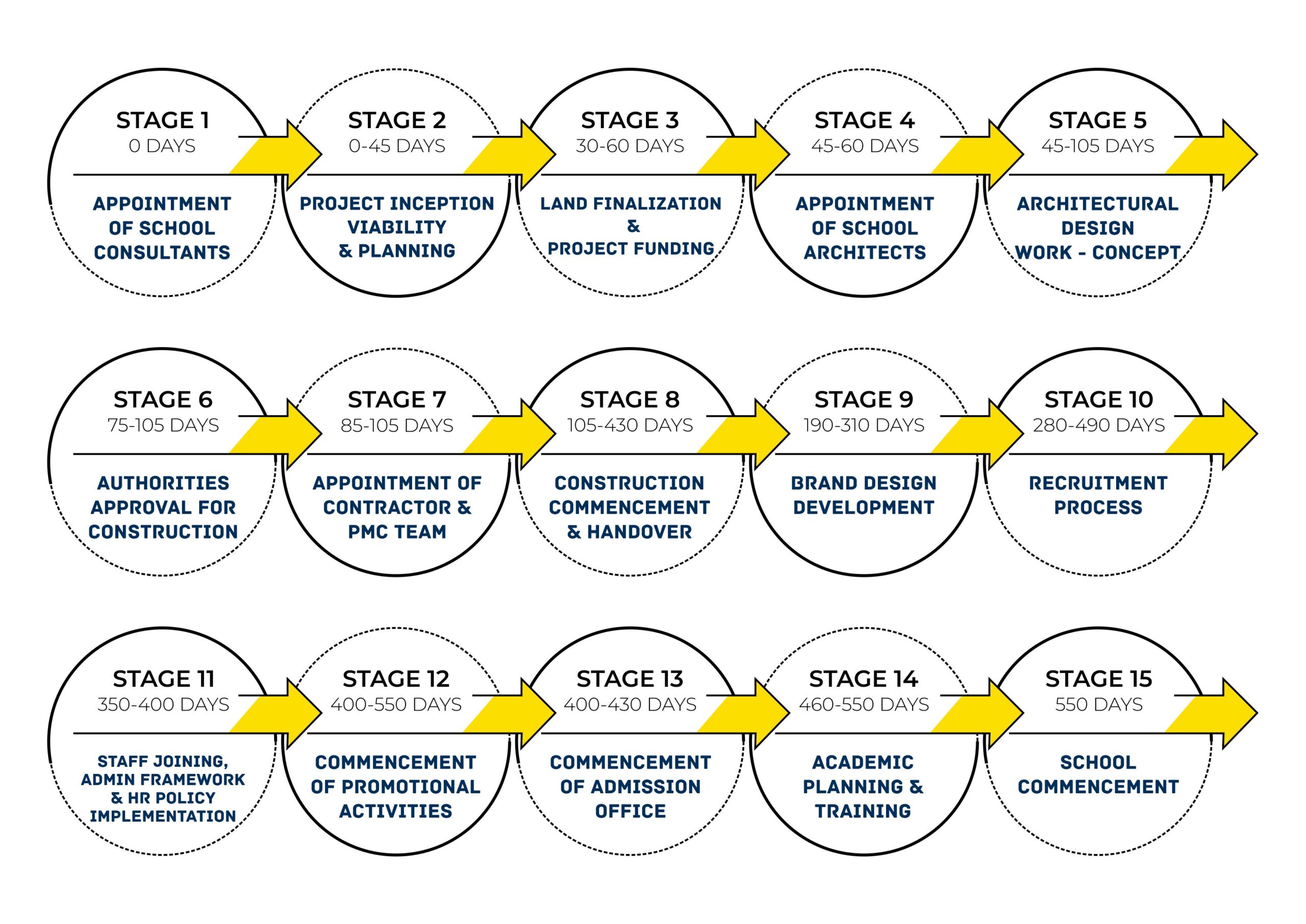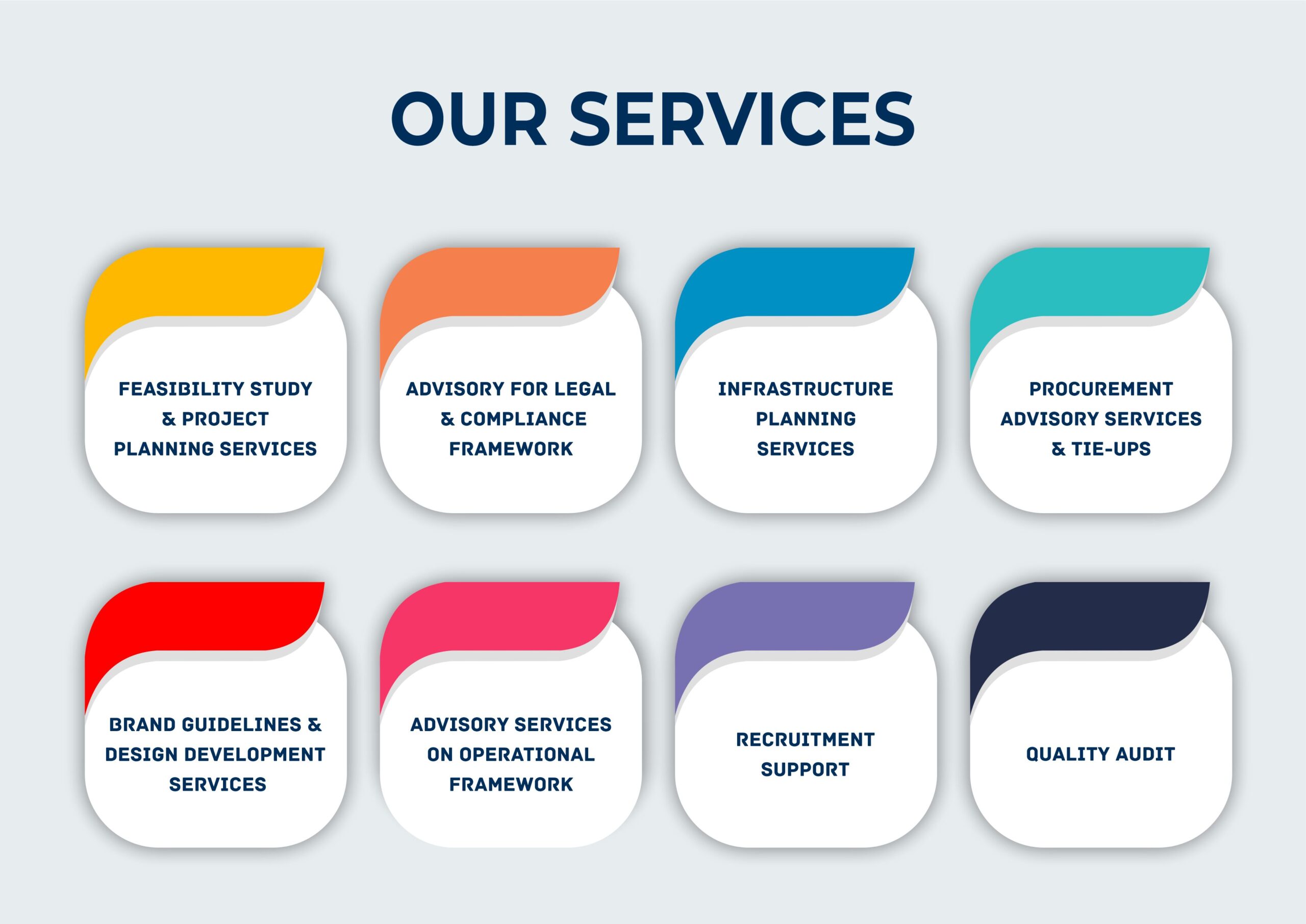Building the Future: From Vision to School in India
AKS Education guides clients through every stage of the school setup process, offering comprehensive insights into operational challenges encountered throughout the project lifecycle. We meticulously safeguard the interests of school promoters, starting from project planning, legal frameworks, branding, marketing, recruitment, administrative structures, staff training, and affiliations. Our expert school consultants excel in establishing CBSE, ICSE, IB, and IGCSE school projects with proven success.
Establishing a school requires detailed planning, encompassing critical elements such as location, budget, services, board affiliation, vision, core team assembly, and curriculum development. To differentiate the school, a strategic approach to marketing, public relations, admissions, pre-launch campaigns, audience engagement, and a well-executed opening ceremony is essential. Our consulting services are customized to meet specific needs, considering all stakeholders and decision-makers. Our mission is to position the school as a leading force and changemaker in the education sector.
Comprehensive Overview for New School Establishment

Planning, Administration, and Management of a New School
Once a school begins operations, the key priorities are student enrolment, academic excellence, and efficient management within budget. However, many school promoters find it challenging to handle day-to-day operations, marketing, and timely coordination of resources.
With our experience in building and managing successful schools, we help institutions achieve strong learning outcomes and operational efficiency.
Our school management consultants design a customized operational plan that includes a clear team structure — combining on-site and home-office support, school staff, and partner organizations. The principal or school head oversees daily operations, supported by a dedicated team from our central office to ensure smooth functioning, quality education delivery, and consistent growth.
Complete School Operations & Management Support
- Annual Budget Planning
- School Consultancy & Strategic Advisory
- Academic & Curriculum Support
- Affiliation Assistance
- Learning Transformation & Quality Audits
- Teacher Training & Skill Development
- Recruitment of Teachers & Staff
- Human Resource Management
- School Systems & Operations Management
- Infrastructure Development
- Branding & Marketing Support
- Website & Digital Presence Management
- Admissions Strategy & Implementation
- Professional Development Coordination
Our Support Services for New School Setup
Frequently Asked Questions
Many new school founders often rush into constructing a school building without first understanding the kind of school that can truly sustain and succeed. Important aspects such as feasibility, budgeting, and compliance with statutory norms are often overlooked.
This leap of faith—driven largely by personal perception rather than data—can lead to significant financial strain. It may take years before realizing whether the chosen approach is delivering the expected outcomes.
To prevent costly missteps, operational challenges, and ambiguity, it’s essential to adopt a data-driven, strategic approach to defining your school’s concept and viability. Before you begin or invest, here are some critical questions you should have clear answers to:
Is there an actual need for a new school in the proposed location?
Who is your target audience, and how do you plan to position your school?
What risks could impact the success of your school project?
Under what conditions will the school thrive and remain sustainable?
What is the estimated cost to establish and operate the school?
How much time will it realistically take to set up and launch?
With a structured, research-backed approach, you can turn your vision into a viable and impactful educational institution.
We offer a complete School Development Plan meticulously designed in collaboration with school promoters – a practical and strategic guide for anyone aspiring to establish a new school.
This plan serves not only as a startup blueprint but also as an implementation and financing guide, often used to secure loans for proposed school projects. Every element of the plan is tailored to ensure your school’s long-term success and sustainability.
Our Development Plan covers every critical aspect of the project, including:
Vision & Educational Philosophy – Defining your school’s purpose and guiding principles.
Organizational Structure – Establishing leadership, governance, and operational frameworks.
Academic & Co-Curricular Programs – Designing well-rounded learning experiences.
Staffing & Skill Development – Building and training an effective team.
Campus Master Plan & Interiors – Creating functional, future-ready learning spaces.
Branding & Market Positioning – Shaping a strong and distinctive school identity.
Statutory & Legal Compliance – Ensuring adherence to all regulatory norms.
Financial Feasibility & 15-Year Cash Flow – Providing a clear financial roadmap.
Market Pricing & Admission Strategy – Aligning affordability with sustainability.
Documentation Framework – Setting policies for staff and student management.
Technology Infrastructure – Integrating modern digital systems for efficiency.
Project Schedule – Offering a realistic, time-bound action plan.
With this structured plan, school promoters gain a clear, data-backed roadmap from concept to execution — ensuring clarity, compliance, and confidence at every step.
Choose the Right Curriculum for Your New School
When starting a new school, one of the most important decisions is selecting the right curriculum or education board. In India, several recognized options are available — you can choose one or even combine multiple approaches based on your vision and target audience.
Here are some popular school curriculum options in India:
State Board – Recognized by the respective State Government and ideal for region-focused education.
CBSE (Central Board of Secondary Education) – One of India’s most popular boards, known for its structured and nationally accepted curriculum.
CBSE-i (CBSE International) – Offers a global approach to CBSE education with an international outlook.
ICSE (Council for the Indian School Certificate Examinations) – Emphasizes strong English language skills, balanced academics, and extracurricular learning.
IB (International Baccalaureate) – A globally recognized curriculum that promotes inquiry-based, student-centered learning.
IGCSE (International General Certificate of Secondary Education) – Offered by Cambridge University, ideal for schools focusing on international education standards.
Early Learning Schools & Child Care Centers – Based on global early childhood philosophies such as Montessori, Reggio Emilia, Waldorf (Steiner), Multiple Intelligences, and EYFS (Early Years Foundation Stage).
There’s no fixed cost for setting up a school in India — the investment varies depending on several key factors. The overall budget depends on your vision, location, and the type of school you plan to build.
Here are some of the main factors that influence the cost of starting a school in India:
Target Market – The community or income group your school aims to serve.
Planned Capacity – The number of students and classes you intend to accommodate.
Land Value – Land costs differ widely depending on city, location, and size of the plot.
Infrastructure Design & Construction – The architecture, layout, and quality of facilities directly impact setup cost.
Facilities Offered – Smart classrooms, sports complexes, labs, libraries, and other amenities add to overall investment.
Academic & Co-Curricular Programs – The range and quality of programs you wish to provide.
Staffing & Educational Resources – Teacher salaries, training, and educational materials.
Branding & Positioning – How you market and establish your school in the chosen area.
Every school project is unique — whether you’re planning a preschool, CBSE school, or international curriculum institution. A detailed feasibility study and financial plan can help estimate the actual investment required and ensure sustainable growth.
The minimum land requirement to start a school in India typically ranges between 500 to 8,000 square meters. However, the exact size depends on several important factors such as:
Location – Urban, semi-urban, or rural areas have different space availability and government norms.
Facilities Planned – The number of classrooms, playgrounds, laboratories, sports areas, and other amenities you want to provide.
Type of School Board or Affiliation – Each board, such as CBSE, ICSE, or State Board, has its own land and infrastructure requirements.
Future Expansion Plans – Schools planning to grow in the coming years may require additional space for future development.
A well-chosen location with the right land size ensures smooth approvals, efficient design, and long-term scalability for your new school.
The cost of building a school in India typically ranges from ₹2,000 to ₹7,500 per square foot. The exact cost depends on several factors, including:
Location – Construction costs vary significantly between cities and regions.
Board of Education – Different boards (CBSE, ICSE, IB, etc.) may require specific infrastructure standards.
Quality of Construction – Premium materials and finishes increase overall cost.
Construction Approach – Whether you use an in-house team or hire a contractor can impact expenses.
Understanding these factors helps plan a realistic budget for your school project and ensures cost-effective investment without compromising on quality.
The time it takes for a school to become financially self-sustainable depends largely on how quickly you can build brand awareness and attract students. For a moderately financed school, the operational break-even is typically expected within 2 to 5 years from the launch.
However, in some cases, break-even may take longer than anticipated. During this period, you will still need to support day-to-day operations while maintaining the school’s reputation and brand positioning.
To ensure smooth operations, it is essential to plan cash flows in advance, accounting for staffing, infrastructure, marketing, and other recurring expenses. A well-structured financial plan helps minimize risks and ensures your school grows sustainably.
The return on investment (ROI) for a new school depends largely on the capital invested and the school’s overall success. Typically, schools achieve ROI within 5 to 15 years from the launch date, assuming normal operational performance.
Note: This estimate does not include additional gains or losses from land value appreciation or depreciation.
Proper planning, strategic marketing, and a sustainable academic model can help shorten the ROI period and ensure long-term growth.
Running a successful school requires a well-organized team covering academic, administrative, and support roles. Key staff positions typically include:
School Leadership – Principal, Coordinators, and Academic Heads
Teaching & Academic Support – Teachers, Lab Assistants
Administrative & Financial Staff – Administrator, Accounts Staff
Support & Operations – Nurses, Gardeners, Drivers, Maids, and other essential personnel
Having the right team in place ensures smooth school operations, quality education, and a safe, well-maintained environment for students.
Before applying for affiliation, it’s important to meet the pre-requisite criteria set by the respective boards you are targeting, such as State Board, CBSE, ICSE, or IB.
We recommend planning your school’s setup around the following key areas:
Academic Programs – The curriculum and subjects you intend to offer.
Co-Curricular & Extracurricular Programs – Activities that support holistic student development.
Learning Environment – The kind of classrooms, facilities, and teaching approaches you wish to provide.
Careful planning in these areas ensures your school meets the board’s standards and creates a strong foundation for long-term success.
Providing the right facilities is essential to ensure all-round development of students. While there is a wide range of amenities you can offer, it’s important to focus on what truly adds value — improving learning outcomes and attracting enrolments — and avoid unnecessary costs.
Some key facilities that enhance student learning and school experience include:
Technology-Enabled Classrooms – Smart boards, digital learning tools, and e-resources.
Language Labs – For improving communication skills and multilingual learning.
Science & Maths Labs – Hands-on experimentation for practical understanding.
Music & Dance Rooms – Encouraging creativity and performing arts.
Art & Craft Studios – Fostering imagination and artistic expression.
Indoor and Outdoor Sports Facilities – Promoting fitness, teamwork, and healthy competition.
Multipurpose Halls – For events, assemblies, and extra-curricular activities.
Transport Services – Safe and reliable commuting for students.
Starting a new school in India comes with unique challenges and opportunities. Each school project is different, and so are the deliverables and support required.
At AKS Education, we provide professional school setup consulting in India with fees tailored to your project’s scope, duration, and complexity. Our flexible fee models make it easy for school promoters and entrepreneurs to access expert guidance:
Per Consulting Day – 6 hours of focused advisory services for your school project.
Monthly Fixed Fee – Continuous support throughout the entire project duration.
Revenue Share Model – Pay based on the school’s financial performance.
Custom Combination – A mix of the above models to suit your specific needs.
Our consultants help you plan, design, and implement your school setup efficiently, covering everything from academic programs to infrastructure, staffing, and regulatory compliance.
Visit our office or schedule a consultation to discuss your project requirements, finalize the scope of work, and understand the exact fees for your school setup.
Yes! AKS Education provides expert school setup services to clients across India. Our experienced team has successfully delivered educational consulting services both nationally and globally, helping schools of all types and sizes.
With AKS Education, language or state is never a barrier — we ensure a seamless school setup experience, tailored to your location and requirements. Strong collaboration with school promoters is at the heart of our approach, making sure every project is planned and executed efficiently.
Whether you are planning a preschool, CBSE, ICSE, IB, or international curriculum school, AKS Education is your trusted partner for end-to-end school development solutions in India.
No, you don’t need affiliation to start a school. You can begin by obtaining the necessary permissions from your State Education Department. Once your school is operational, you can apply for affiliation, which will require details about your school’s functioning and programs.
To learn everything about planning, setting up, and running a school successfully, check out our detailed guide: Thinking of Starting a School in India
Many school promoters wonder: Can a school in a rented or leased building get CBSE affiliation in India? The answer is yes, if the school meets the specific CBSE requirements.
Key conditions for CBSE affiliation on leased property:
The school building must be on a lease of at least 15 years.
The land should be owned by the Trust/Society or the school, or held on a lease of at least 15 years.
The minimum total land area, including the school building and playground, should be 1.49 acres, though this may vary depending on the region or city.
Complying with these guidelines ensures that your school is eligible for CBSE affiliation, even when operating on leased property. This makes it possible for educational entrepreneurs to start a CBSE school in India without owning the land outright, while still meeting national standards.
When setting up a school, it’s important to follow regulatory guidelines for school governance. A school-run Trust or Society cannot have more than 50% of its members from the same family.
The Trust/Society’s non-proprietary affidavit must include a declaration by the Chairman stating the number of mutually related members. To ensure transparency and compliance, it’s recommended to keep the number of family members on the governing board or school management committee as low as possible.
Following these guidelines helps maintain credibility, ensures smooth approval processes, and aligns your school with legal and regulatory norms in India.
If you plan to start a CBSE school in India or an ICSE school, obtaining state board recognition is a mandatory first step. The State Education Department must issue a No Objection Certificate (NOC), confirming that there is no objection to your school seeking affiliation with CBSE or CISCE.
This step is crucial because CBSE and ICSE affiliation cannot be granted without prior state approval. Ensuring compliance with state regulations helps your school operate legally and smoothly.
For a complete guide on the affiliation process, read our detailed blog posts:
- How to Start an ICSE School and Secure State Board NOC
While the salaries for teachers and staff may sometimes be lower than state-recommended levels, it is mandatory for every school to have EPF (Employees’ Provident Fund) registration.
Salary variations are allowed depending on the cost of living in different regions, but schools must ensure:
Transparent banking and financial records – All salary transactions should be clearly documented.
No financial irregularities – Compliance with statutory requirements is essential.
Complete financial documentation – Maintaining proper records is a must for audits and approvals.
Starting a school in India requires careful planning and obtaining several legal permissions and documents. These ensure your school is compliant with local regulations, safety standards, and education board requirements.
Here is a checklist of the key documents and approvals needed:
Founding Documents – Trust, Society, or Company registration papers.
Affidavit – Non-proprietary Trust/Society/Company declaration.
Memorandum of Association – Agreement between the school and the Trust/Society/Company.
Land & Building Documents – Ownership proof, sale deed, or lease deed.
Change of Land Use Certificate – Approval for using the land for school construction.
Municipal Approval – Map sanctioned by the local municipal authority.
Building Plans & Blueprints – Detailed architectural designs of the school building.
Building Safety Certificate – Compliance with safety regulations and structural standards.
No Objection Certificate (NOC) / Essentiality Certificate – Issued by the State Education Department.
State Board Affiliation – Mandatory for recognition under a state or central board.
Employee Registrations – EPF (Employees Provident Fund) and ESIC (Employees’ State Insurance Corporation) registration for staff.
If you are planning to start a CBSE school in India, it’s important to understand the minimum land requirements set by the Central Board of Secondary Education (CBSE). These requirements ensure adequate space for classrooms, playgrounds, and physical education facilities.
Cities with population above 15 lakh – CBSE mandates a minimum of 1.49 acres of land, including the school building, playgrounds, and sports facilities.
Hilly and mountainous areas – A minimum of 1 acre of land is sufficient due to terrain constraints.
Meeting these land requirements is crucial for CBSE affiliation approval and helps create a safe, well-planned school campus that supports both academic and extracurricular growth.
If your school already has a qualified serving Principal, there’s no need to appoint a new one.
For schools seeking CBSE, ICSE, or International Board affiliation, finding the right Principal and teaching staff is crucial. Platforms like edcon.co.in make this easy — connecting you with highly qualified, experienced educators who meet all board eligibility requirements.
By hiring through a trusted portal, you can save time, ensure compliance, and strengthen your school’s academic foundation, setting your institution up for long-term success.
Starting a school is not as simple as it seems. Without professional support, school promoters often have to manage everything themselves — from finding and coordinating with vendors to selecting materials and procuring all necessary school supplies and resources.
This time-consuming process can be overwhelming and may delay your school launch. A turnkey school setup solution ensures that all these critical tasks are handled efficiently, allowing you to focus on your school’s vision and educational goals.
Buy Land or Operational Schools for Sale in India
Planning to start a school in India? Our Sell & Buy Department helps you find the ideal property for your educational venture. We specialize in:
Land for school construction – Find plots in prime locations to build your dream school.
Operational schools for sale – Acquire fully functional schools ready for immediate operations.
Schools available for lease – Flexible options to start without a long-term commitment.
Whether you want to buy land for a school in India or invest in an operational school, at AKS Education, we make the process simple, transparent, and tailored to your requirements. Secure the right property and start your educational project with confidence.
Starting a school in India requires careful planning of land, infrastructure, and facilities to meet board-specific standards. The requirements for CBSE, ICSE, IGCSE/Cambridge, and IB schools vary depending on factors like school capacity, type of accommodation, terrain, and geographic location.
CBSE School Infrastructure Requirements in India: CBSE emphasizes spacious classrooms, labs, libraries, playgrounds, and essential facilities to create a well-rounded learning environment.
ICSE School Setup Requirements: ICSE schools focus on academic excellence along with co-curricular facilities, ensuring sufficient space for interactive and experiential learning.
IGCSE/Cambridge School Setup in India: Cambridge schools may need relatively smaller land than CBSE/ICSE but must provide a complete environment for student activities and global pedagogy.
IB School Setup in India: IB schools prioritize holistic development, collaborative learning spaces, and flexible classrooms to support international standards of education.
Even CBSE, ICSE, or State Board schools can run international programs if the infrastructure meets global standards.
For step-by-step guidance and board-specific infrastructure requirements, explore these detailed articles:












